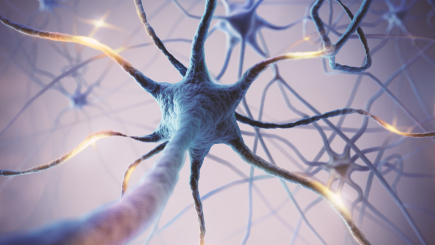
Learn about bioelectricity with online courses and programs
Explore the physiological processes of the human body. Learn about bioelectricity with online courses delivered through edX.

What is bioelectricity?
Bioelectricity is a concept in biology that involves the generation and use of electrical signals by living organisms, like an electric power grid. At the heart of bioelectricity are tiny, charged particles called ions, which are found inside cells. These ions can move in and out of cells through specialized channels in the cell membranes. When ions move, they create an electrical flow or current, like electricity flowing through wires.
This electrical activity is crucial for many biological processes. In the nervous system, for example, bioelectric signals travel along nerve cells to transmit information from the senses to the brain, enabling movement. In muscles, bioelectricity helps control muscle contractions, allowing walking, talking, and various other actions. Bioelectricity also plays a role in regulating heartbeats, triggering chemical reactions, and helping to heal wounds. Scientists are still discovering many of its secrets and exploring its potential in areas like regenerative medicine and bioengineering.1
Browse online bioelectricity courses
Related Topics
Bioelectricity course curriculum
Online courses related to bioelectricity can cover a variety of topics, such as:
- Biology or physiology: Provides a foundation for understanding the principles of bioelectricity by covering cellular biology, physiology, neuroscience, and more.
- Biophysics: Explores the application of physics principles to biological systems, including bioelectric phenomena, and can include topics such as ion channels, membrane potentials, and electrical signaling in cells.
- Biomedical engineering: Covers information related to medical devices, signal processing, and bioelectrical measurements.
- Neuroscience: Delves into the intricacies of the nervous system, including bioelectric signaling in the brain and throughout the body.
- Regenerative medicine: Examines medicine used to repair or replace damaged tissues and organs. It intersects with bioelectricity through research into electrical stimulation and its role in tissue regeneration and wound healing.
edX offers online courses that allow learners to study many different disciplines, including biology, engineering, and more. From accelerated boot camps to comprehensive programs that allow you to earn a bachelor’s degree or (for more advanced learners) a master’s degree, there are many different learning formats available to fit your needs. Busy professionals can even take advantage of executive education programs. Find the right course for you.
Why learn about bioelectricity?
A deep understanding of bioelectricity can be beneficial for a variety of careers, including:
- Biomedical researcher: Works in academic institutions, pharmaceutical companies, or research organizations to investigate the role of bioelectricity in various biological processes.
- Clinical electrophysiologist: Specializes in diagnosing and treating conditions related to the electrical activity of the heart or nervous system. They perform procedures like electrocardiograms (ECGs) and electromyography (EMG) to help diagnose and treat patients with heart arrhythmias, neuromuscular disorders, and more.
- Biomedical engineer: Designs and develops medical devices and equipment, such as EEG (electroencephalogram) machines, pacemakers, and neurostimulation devices.
- Neuroscientist: Studies the brain and nervous system, including the bioelectric signals that drive neural communication.
- Clinical neurophysiologist: Diagnoses and treats neurological disorders, and assesses and manages conditions like epilepsy, nerve injuries, and neuromuscular disorders.
Are you interested in making the leap into a new career? Start building the knowledge and skills you need with edX.
More opportunities for you to learn
We've added 500+ learning opportunities to create one of the world's most comprehensive free-to-degree online learning platforms.
Bioelectricity. (2023). Britannica. Retrieved on October 18, 2023.